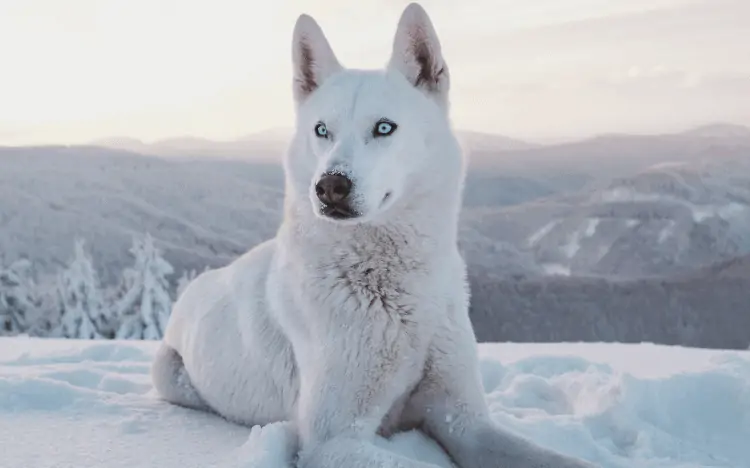Last Updated on
The Huskypoo, also known as a Huskydoodle, a Siberpoo, and a Siberdoodle is a unique mixed breed dog.
This post will guide you through everything you need to know about the Huskypoo, including why you might want to reconsider adding one to your family.
Ready to go? Let’s dive in.
What is a Huskypoo?
A Huskypoo is a Husky Poodle mix. No surprises there.
Because they’re mixed with a Poodle, there’s a chance they might shed less. Although, this isn’t guaranteed.
Temperament
Let’s quickly learn about the parent breeds of the Huskypoo, so you understand all the characteristics a Huskydoodle puppy may inherit.
Siberian Husky
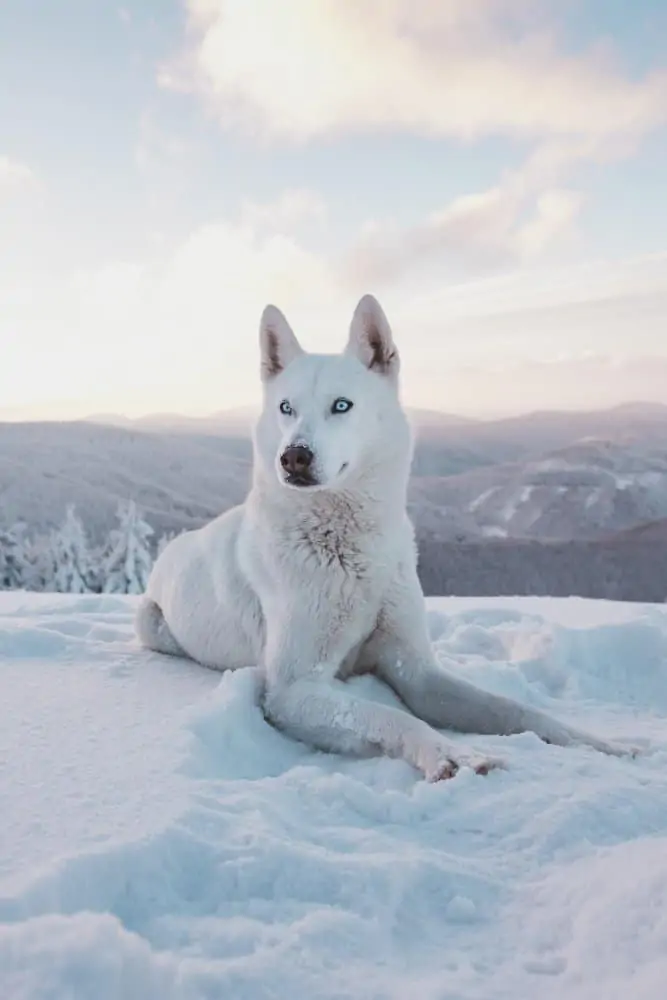
Siberian Huskies are known for their friendly and outgoing personalities. They are highly social animals that love spending time with people and other dogs. Huskies are also known for their playful and curious nature, which can sometimes get them into trouble when not properly supervised.
They can also be highly stubborn, which can sometimes make them challenging to train (but entertaining, nonetheless). Their independent nature, combined with their intelligence and high energy levels, can result in them becoming easily bored with repetitive tasks and commands.
Despite their independent nature, Huskies are also highly loyal and affectionate towards their owners. They love nothing more than snuggling up next to their humans.
Lastly, Huskies are high-energy dogs. They need plenty of exercise and mental stimulation, otherwise, they can get bored and destructive. This can be accomplished through daily walks, runs, dog puzzles, and fun activities like nose work, skijoring, and more.
Overall, the Siberian Husky is a wonderful dog for those who are prepared to provide them with the love, care, and attention they need. You’ll never be bored with a Siberian Husky in your home!
Standard Poodle
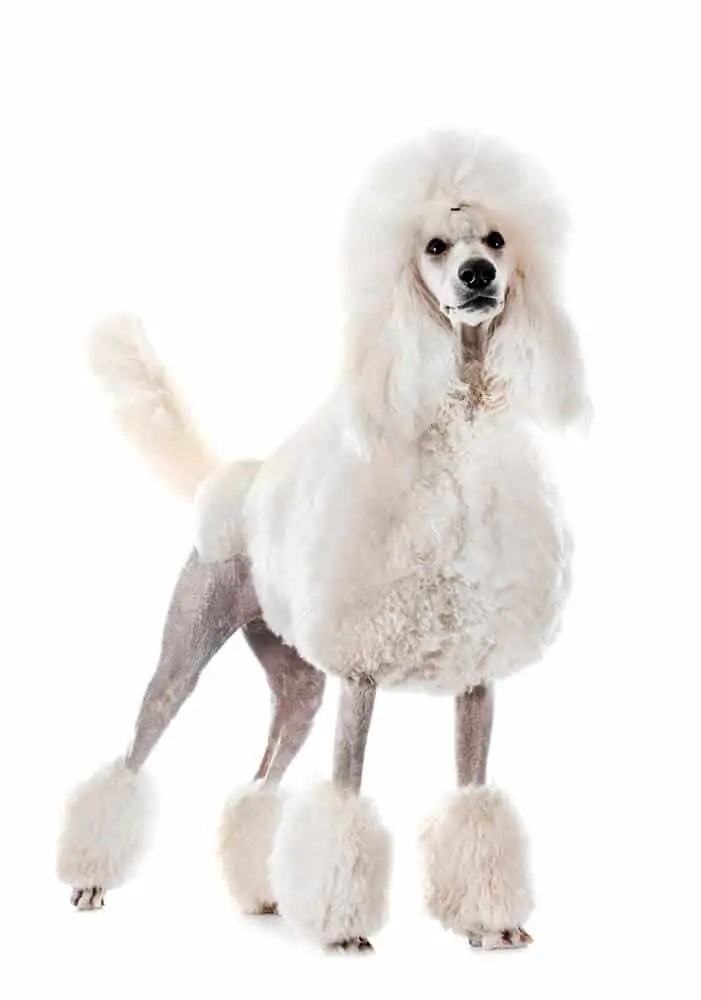
Standard Poodle
Poodles are one of the most intelligent dogs, coming in as the second smartest dog in the world. They’re fun-loving, witty, and mischievous.
Although Poodles are the image of elegance, they were bred for physical tasks and are known as water retrievers.
Like the Siberian Husky, Poodles need lots of mental and physical stimulation to prevent boredom. They’re easy to train and unlike Siberian Huskies, they aren’t stubborn—Poodles love to please and learn new commands!
Apart from being incredibly hard-working, they love spending time with their families and are quite affectionate. They’re alert, and protective, and can develop separation anxiety if you’re not home often.
Huskypoo
Now that you know about both parent breeds, let’s discover what Huskypoos are like.
Affectionate
Huskypoos are known for their devotion to their families and their love of cuddling and spending time with their owners. They form strong bonds with their humans and thrive on attention and affection.
Intelligent
Since both the Poodle and Siberian Husky are smart, you can expect the Huskypoo to be just as sharp. They respond well to positive reinforcement and enjoy being mentally challenged with new commands and tricks.
Energetic
Huskies were originally bred to pull sleds in the snow and Poodles were bred for water retrieving. As these two dog breeds are highly energetic, you can expect a Huskypoo to be just as energetic. Huskypoos require plenty of exercise, otherwise, they can get incredibly stressed and bored. You should expect to exercise your Huskypoo for a minimum of 2 hours every day.
Stubborn
The stubbornness of the Husky gets passed down to the Huskypoo. You’ll need consistency and patience when training a Huskypoo.
Protective
Huskypoos are an alert dog and have strong protective instincts. They’ll bark to alert their owners of potential danger and keep your home safe. However, proper socialization is important to prevent excessive barking or aggression toward visitors.
Strong prey drive
Huskypoos love to live with a pack. They do great in multi-dog households, however, due to their prey instinct, they aren’t suitable for homes with cats and other small animals.
Appearance
Huskypoos have an incredibly unique appearance. Let’s discuss the various ways a Huskypoo can look.
Coat
Huskypoo’s tend to have shaggy coats that are a mix between the Poodle’s curly coat and the Husky’s straight double coat.
Keep in mind it’s impossible to determine if the Huskypoo puppies will be non-shedding until they’re full grown.
Color
A Huskiedoodle’s fur coat color comes from the Husky parent and can be a blend of white, black, gray, and brown, or solid, like the Poodle.
Eyes
What makes Huskypoos unique from other Doodle-type dogs is their eyes. Often, Huskypoos inherit striking blue eyes from their Husky parent. These eyes contrast beautifully with their colorful coats.
Size
The size of a Huskydoodle can vary greatly depending on the size of the husky and Poodle parent. Poodles are available in three sizes, including toy, miniature, and standard. The size of the Poodle used for breeding with the Husky determines the size of the Huskypoo.
Here are the three different sizes:
Standard
A standard Huskypoo is the largest of the three. Standard Huskypoos are bred using a Standard Poodle and a Siberian Husky.
- Height: 21-23.5 inches
- Weight: 35-60 pounds
Mini
Next is the Mini Huskypoo. These are bred with Miniature Poodles and a Siberian Husky.
- Height: 12-16 inches
- Weight: 15-35 pounds
Toy
Lastly, we have the smallest of the bunch, the Toy Huskypoo. Toy Huskypoos are incredibly rare and are bred with a Toy Poodle and a Siberian Husky.
- Height: 8-10 inches
- Weight: 6-9 pounds
Training a Huskypoo
We’ve already mentioned how a Husky Poodle mix is intelligent but stubborn, so what does that mean for training?
Well, it can be a mixed bag.
Sometimes, Huskypoos will take more after their Poodle parent and will be eager to please. Othertimes, they’ll be more like the Siberian Husky with their stubbornness.
Regardless, you can set your Huskypoo up for success through consistent training and patience. Here are some ideas:
- Have a schedule for things like feedings and walks
- Giving your dog a job and a sense of purpose
- Give them puzzles every day so they direct their energy in a positive way
- Set—and adhere to—rules and boundaries
Set up training routines and start obedience training at a young age so your pup learns what is expected early on.
Space needed
Given their energetic nature, a Huskypoo will thrive in home with a big yard. They can live in smaller spaces, provided you take them out for enough walks and playtime throughout the day.
Grooming
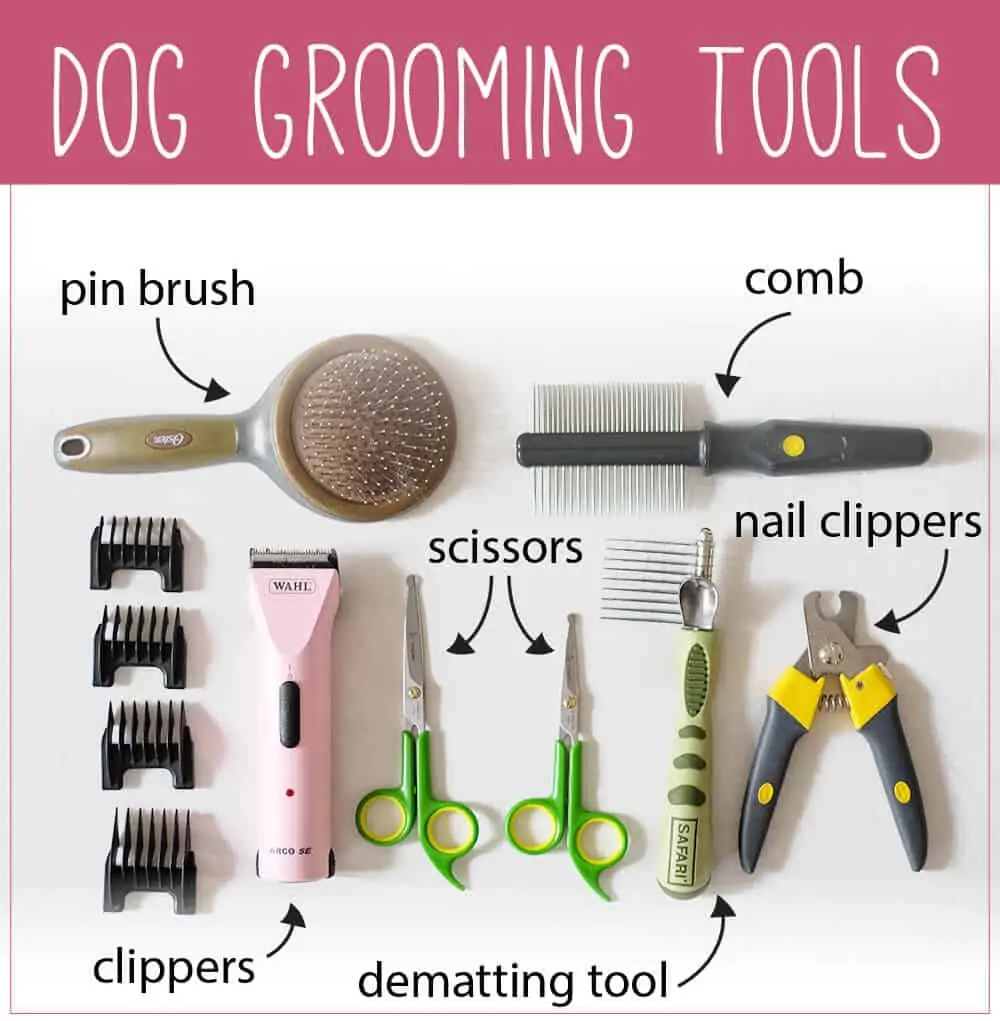
Because Huskypoos inherit their low-shedding coat from the Poodle, they need frequent brushing and combing. Otherwise, they can get painful tangles, mats, hotspots, and even skin infections.
You can expect to brush your Huskypoo for 30-45 minutes every day to keep their hair tangle-free.
And while you can also try grooming your Huskypoo at home, you’ll still want to take frequent trips to the groomers—every six to eight weeks is fairly typical.
Aside from brushing and combing, Husky Poodle mix dogs need frequent ear cleanings because they have floppy ears. A lot of dirt can get stuck in Huskypoo’s ears and it’s necessary to clean them out every so often. It’s best to check with your vet as to how often you should clean your pooch’s ears.
Price
Husky Poodle mix dogs usually cost around $1,500, but the price can go up depending on where you live and the level of demand.
You should also search Doodle rescues for Huskypoos in need of loving homes.
Health problems
Both Poodles and Siberian Huskies are generally healthy breeds, but like all dogs, they can be prone to certain health issues. Here are some common health issues that both breeds may experience:
- Hip Dysplasia: This is a common genetic disorder in dogs that affects the hip joint, causing pain, lameness, and arthritis. Both Poodles and Siberian Huskies are susceptible to hip dysplasia, so it’s important to buy from a reputable breeder who screens their dogs for this condition.
- Eye Problems: Poodles are prone to several eye problems, including cataracts, progressive retinal atrophy, and glaucoma. Huskies are prone to eye issues as well, including cataracts and corneal dystrophy.
- Epilepsy: This is a neurological disorder that can cause seizures in dogs. Both Poodles and Huskies can be prone to epilepsy, which may be genetic or caused by other factors.
- Hypothyroidism: This is a hormonal disorder that affects the thyroid gland, which can cause weight gain, lethargy, and skin problems.
Lifespan
A Husky Poodle mix can live for 10 to 13 years.
Why you shouldn’t get a Huskypoo
I promised we’d discuss reasons why you shouldn’t get a Huskypoo, and here they are:
- Huskypoos are stubborn. If you aren’t confident in your training abilities or lack patience, Huskypoos are not the right dog for you.
- Huskypoos require a lot of exercise. You can’t take a day off from exercising a Huskypoo. If you can’t commit to a minimum of two hours a day, you’re better off with a less energetic dog.
- Huskypoos need plenty of grooming. As Huskypoos don’t shed, they require lots of brushing and combing. If you can’t see yourself enjoying all those at-home grooming sessions, you’ll likely want to consider another dog breed.
Summary
Huskypoos take all the loveable traits of a Husky and a Poodle and combine them together.
If you’re looking for an active dog to keep up with your active lifestyle, the Huskypoo may make a great companion!
This article may include affiliate links. www.travellingwithadog.com is a participant of Amazon.com Services LLC Associates Program. As an Amazon Associate, I earn a commission from qualifying purchase. www.travellingwithadog.com participates in other affiliate programs, and recieves commissions when purchases are made through the links. The cost is not inflated to account for the commission earned.
Veterinary Disclaimer: travellingwithadog.com is not a substitute for veterinary advice and does not intend to provide any type of veterinary advice for your animals. Please consult your vet for any questions you have regarding your pets health.
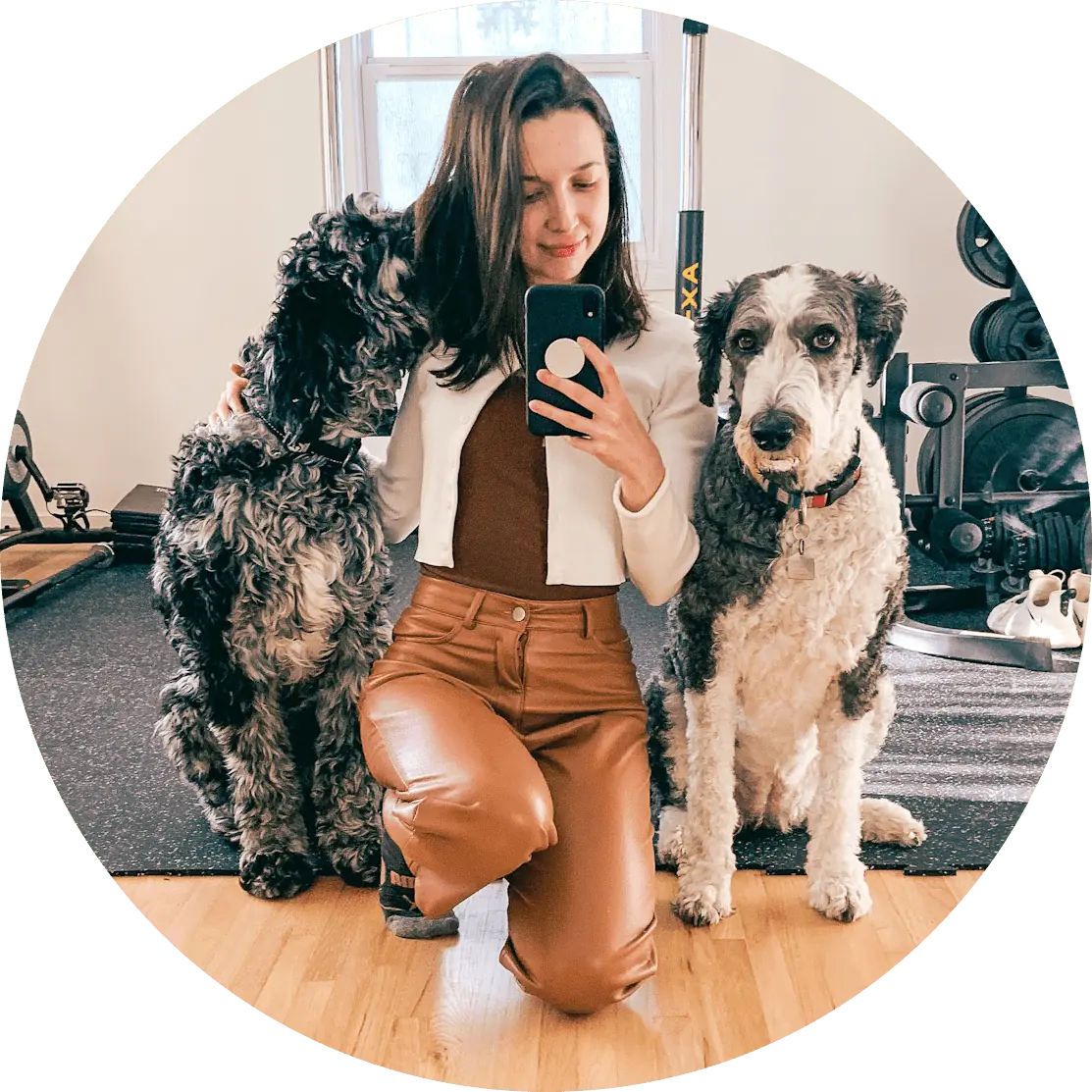
About the Author:
Dana owns a Sheepadoodle and a rescue merle Labradoodle. Her first dog growing up was a white Toy Poodle and she’s loved dogs ever since. She has years of experience fostering dogs and has helped find homes for a variety of different breeds, both large and small! After seeing so many dogs end up unwanted and in shelters, she began blogging about different dog breeds (specifically Doodle dogs, since that’s what she knows best) to help people make informed choices when adding a new member to their family.
When Dana’s not brushing her Doodles’ hair (it takes a lot of time for two!) you can find her playing nose work games and fetch with her two amazing pups.
Learn more about her here.

